


When it comes to doing laundry, people often look for ways to ensure their clothes are clean and fresh. One common question that arises is whether it is safe to use toilet bleach in your washing machine.
Toilet bleach, also known as toilet bowl cleaner, is designed to be used in the toilet to remove stains and kill bacteria. While it may seem like a convenient option to use in the washing machine, there are some important considerations to keep in mind.
First and foremost, it is essential to check the manufacturer’s instructions for your washing machine. Some machines may be compatible with certain types of bleach, while others may not. Using the wrong type of bleach could potentially damage your machine or affect the quality of your clothes.
In addition, toilet bleach typically contains harsh chemicals that are not suitable for use on fabrics. These chemicals may be too strong and can cause discolouration or damage to your clothes. It is important to choose a bleach specifically designed for laundry use, as these products are formulated to be safe and effective for washing machine use.
In conclusion, it is not recommended to use toilet bleach in your washing machine. Using the wrong type of bleach can damage your machine or clothes and may not effectively remove stains or kill bacteria. It is best to choose a bleach specifically made for laundry use to ensure the safety and cleanliness of your clothes.
Can you use toilet bleach in your washing machine?
Using toilet bleach in your washing machine may seem like a convenient solution for cleaning your clothes, but it can be potentially harmful and damaging to your machine and your clothes.
1. Chemical Composition:
Toilet bleach, also known as toilet bowl cleaner, contains chemicals such as chlorine or bleach, which are designed for specific purposes and not meant for use on fabric. These chemicals can be too harsh for your washing machine’s components, leading to corrosion and breakdown over time.
2. Fabric Damage:
The strong chemical composition of toilet bleach can also damage your clothes. It can cause discoloration, fading, or even bleach spots on the fabric, especially for delicate or colored items. This can ruin your garments and make them look worn out or ruined.
3. Health and Safety:
Using toilet bleach in your washing machine can also pose a health risk. The strong fumes and vapors released during the washing cycle can be harmful if inhaled, especially for individuals with respiratory conditions, allergies, or sensitivities.
4. Alternative Options:
Instead of using toilet bleach, it is recommended to use laundry-specific bleach or stain removers that are specifically formulated for use on clothes and in washing machines. These products are designed to be gentler on fabrics and offer effective stain removal without causing damage or health hazards.
Conclusion:
While it may be tempting to use toilet bleach in your washing machine, it is not safe or recommended. The chemicals in toilet bleach can damage your machine, ruin your clothes, and pose health risks. It is best to stick to using laundry-specific bleach or stain removers for your washing machine needs.
Understanding the risks
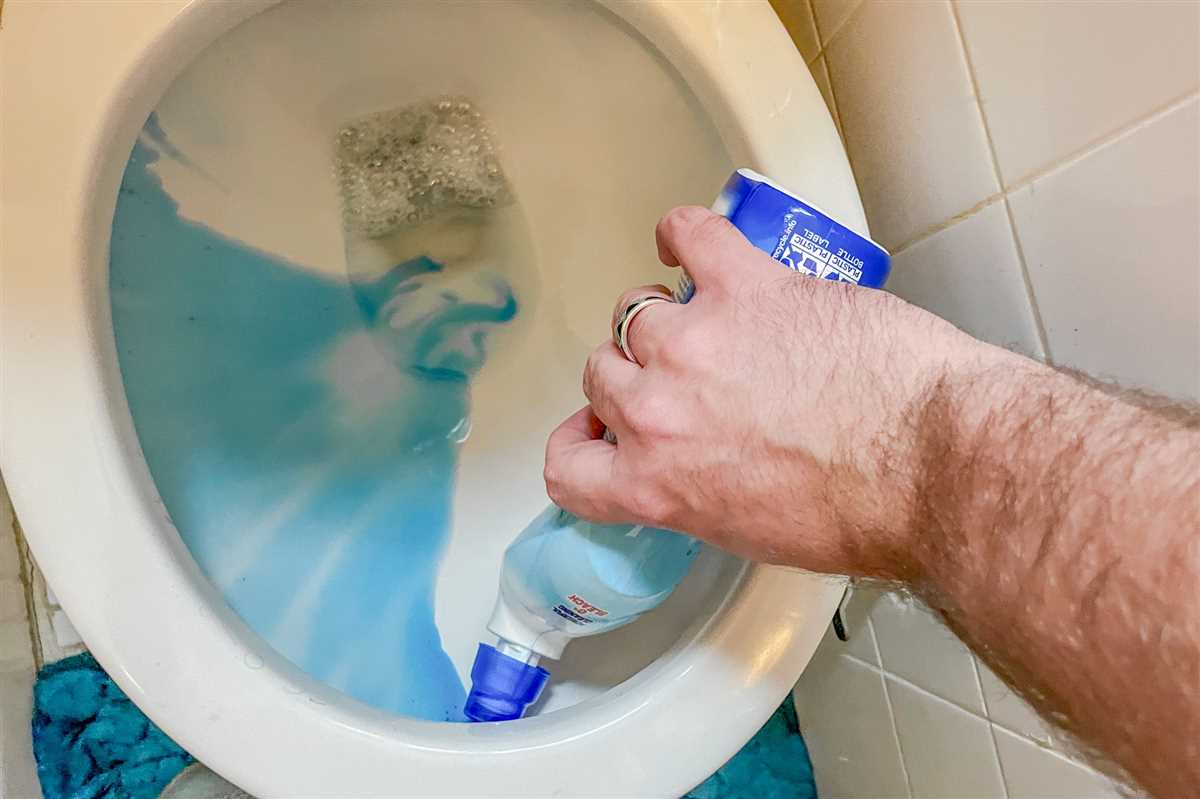
Using toilet bleach in your washing machine can pose several risks. While it may seem like a convenient way to disinfect your clothes, it’s important to be aware of the potential dangers involved.
1. Damage to the washing machine
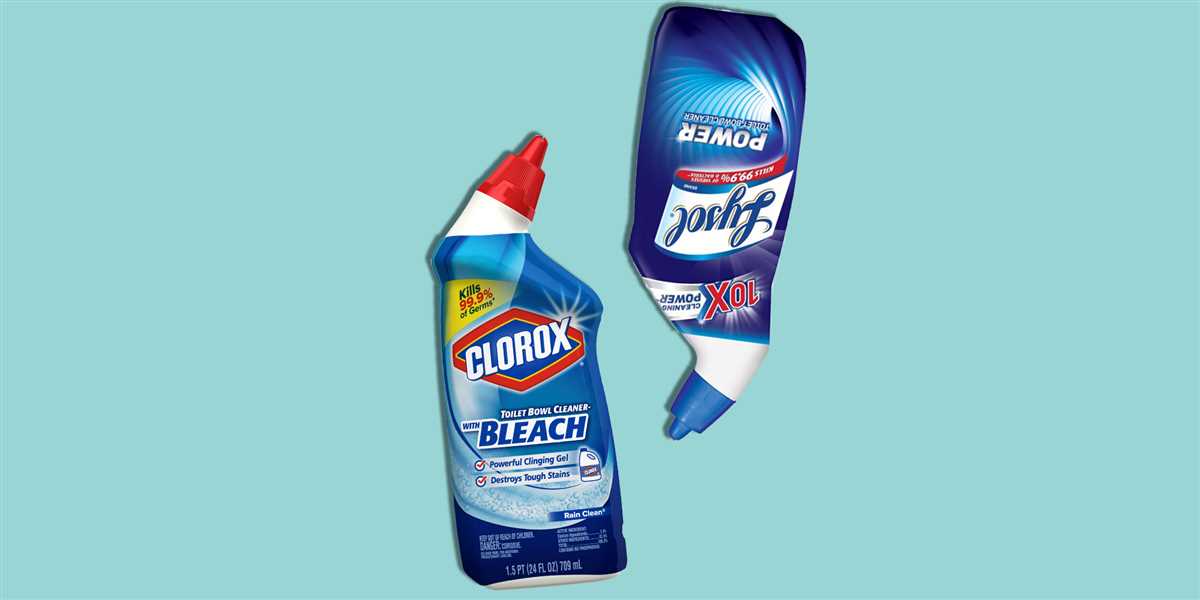
Many washing machine manufacturers advise against using bleach or harsh chemicals in their machines. The chemicals in bleach can cause damage to the internal components, such as rubber seals, hoses, or even the drum. This can lead to leaks, malfunctions, and costly repairs.
2. Health hazards
Toilet bleach is highly concentrated and contains strong chemicals, such as chlorine and sodium hypochlorite. These chemicals can be irritating to the skin, eyes, and respiratory system. If any residue or fumes are left on your clothes after washing, they can come into contact with your skin and cause irritation or allergic reactions.
3. Fabric damage
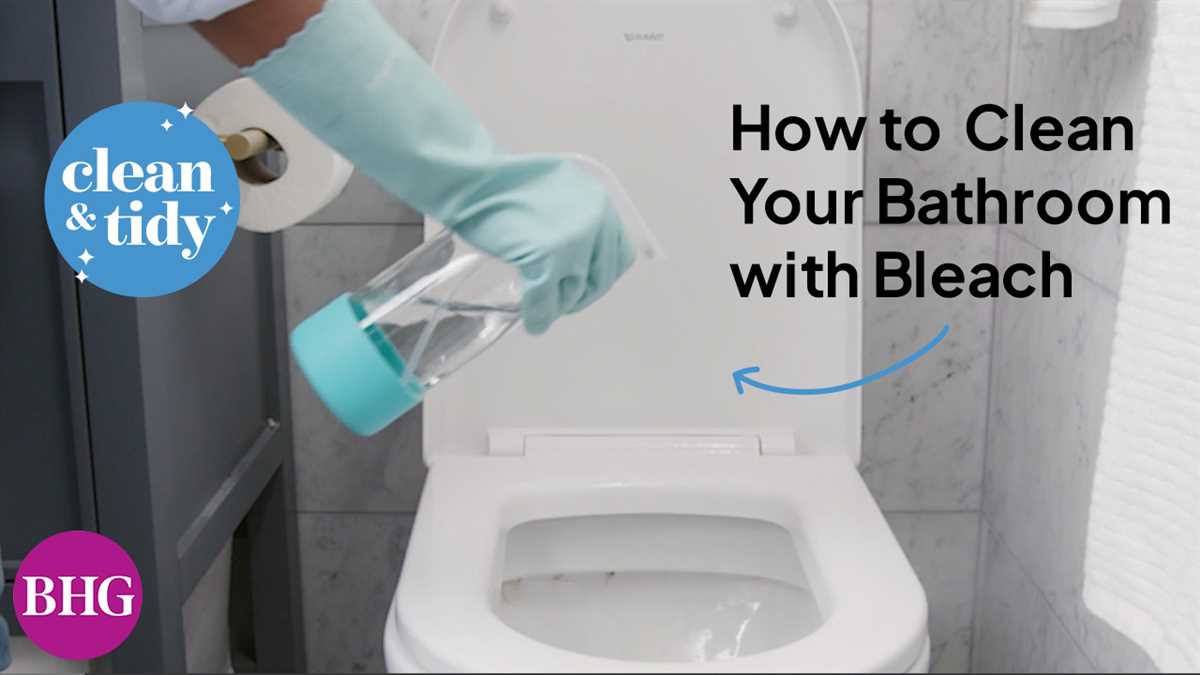
The strong bleaching agents in toilet bleach can also damage the fabric of your clothes. They can cause discoloration, weakening of fibers, and even holes in your garments. This can be particularly problematic for delicate fabrics, such as silk or wool, which may not be able to withstand the harsh chemicals.
4. Environmental impact
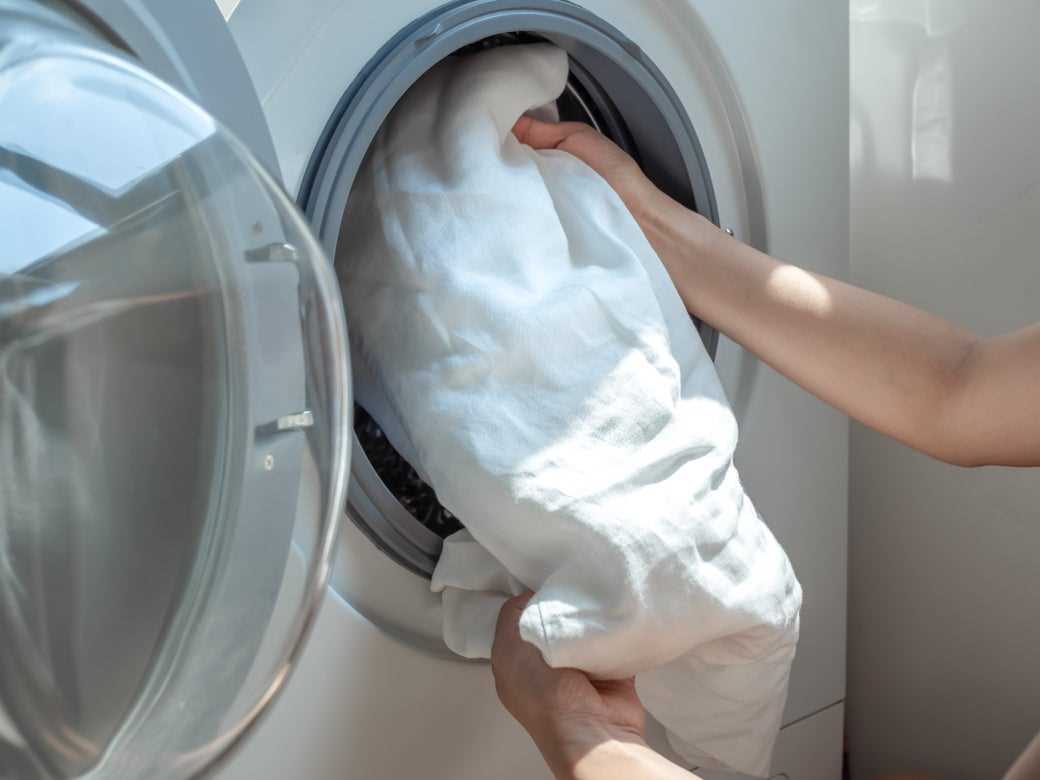
Using toilet bleach in your washing machine can also have a negative impact on the environment. The chemicals in bleach are not easily biodegradable and can contaminate water sources if not properly treated. Additionally, the production and disposal of bleach contribute to pollution and energy consumption.
Conclusion
While using toilet bleach in your washing machine may seem like a quick solution for disinfecting your clothes, it’s important to consider the potential risks involved. To ensure the longevity of your washing machine, protect your health, and preserve the environment, it’s best to opt for safer alternatives, such as using laundry detergents specifically designed for your machine.
Potential damage to your washing machine
- Bleach can cause corrosion: Toilet bleach is a strong chemical that can cause corrosion in the internal parts of your washing machine, such as the rubber seals, hoses, and pump. Over time, this corrosion can lead to leaks or malfunctions.
- Damage to the drum: If bleach is used regularly in your washing machine, it can cause damage to the drum. The bleach can weaken the material of the drum, leading to cracks or holes. This can result in water leakage or even the need to replace the entire drum.
- Discoloration of clothes: When bleach is used in a washing machine, it can sometimes cause discoloration or damage to your clothes. This is especially true for colored or delicate fabrics. The bleach may not always be properly diluted or rinsed out, leading to unwanted effects on your laundry.
- Interference with other cleaning agents: If you have used other cleaning agents or laundry detergents in your washing machine, adding bleach to the mix can cause chemical reactions that may damage your machine or affect the cleaning performance of both the bleach and the other agents.
- Voiding the warranty: Most washing machine manufacturers do not recommend using bleach in their machines, and doing so may void your warranty. If any damage occurs as a result of using bleach, you may have to pay for the repairs out of pocket.
To avoid potential damage to your washing machine, it is best to follow the manufacturer’s guidelines and avoid using toilet bleach in your machine. Instead, opt for milder and specifically formulated laundry detergents that are designed for use with washing machines.
Impact on your clothes
Using toilet bleach in your washing machine can have a significant impact on your clothes. While it may effectively remove stains and kill bacteria, it can also cause damage to the fabric and alter its color.
1. Fabric damage: Toilet bleach contains harsh chemicals that can weaken the fibers of your clothes over time. This can result in thinning, fraying, or holes in the fabric. Delicate fabrics such as silk, lace, and wool are particularly susceptible to damage.
2. Color fading: Bleach is a powerful agent that can strip away the natural dyes in your clothes, causing them to fade or discolor. Brightly colored or patterned garments may lose their vibrancy and become dull or uneven in color.
3. Yellowing: Bleach can react with certain fabrics or substances in your clothes, creating a yellowish tint in the affected areas. This can be especially noticeable on white or light-colored garments.
4. Stain removal: While bleach can effectively remove stains, it is important to use it sparingly and follow the instructions carefully. Overusing bleach can result in residual stains or bleach spots on your clothes, making them look worn or discolored.
5. Allergies and skin irritation: Some people may be allergic or sensitive to the chemicals in bleach, which can cause skin irritation or allergic reactions when in contact with the treated clothes. It is advisable to wear gloves and handle bleached garments with caution.
Overall, the use of toilet bleach in your washing machine can have a negative impact on the appearance and quality of your clothes. It is recommended to use bleach alternatives or specialized laundry detergents that are specifically designed to be gentle on fabrics while still providing effective stain removal and sanitization.
Alternative cleaning solutions
If you are concerned about the safety of using toilet bleach in your washing machine, there are several alternative cleaning solutions available that can effectively clean your machine without potentially harmful chemicals.
Vinegar
Vinegar is a natural and safe cleaning agent that can effectively remove dirt, grime, and odors from your washing machine. Simply add one cup of white vinegar to a hot water cycle and run the machine empty. This will help to remove any build-up and leave your machine smelling fresh.
Baking soda
Baking soda is another natural and safe option for cleaning your washing machine. Mix half a cup of baking soda with one quart of water and pour it into the detergent dispenser. Run a regular cycle with hot water and this will help to remove any residue and neutralize any odors.
Lemon juice
Lemon juice is a natural disinfectant and can help to remove stains and odors from your washing machine. Squeeze the juice of one lemon into a cup of water and pour it into the detergent dispenser. Run a regular cycle with hot water and this will help to freshen up your machine.
Hydrogen peroxide
Hydrogen peroxide is a powerful cleaning agent that can effectively remove stains and disinfect your washing machine. Add half a cup of hydrogen peroxide to a hot water cycle and run the machine empty. This will help to kill any bacteria and leave your machine clean and fresh.
Cleaning tablets
There are also commercially available cleaning tablets specifically designed for washing machine maintenance. These tablets dissolve in water and can effectively remove dirt, grime, and odors from your machine.
- Read the instructions carefully before using the cleaning tablets.
- Follow the recommended dosage and usage instructions.
- Run a hot water cycle with the cleaning tablet to ensure proper cleaning.
Using alternative cleaning solutions can help to keep your washing machine clean and odor-free, while also providing a safer option compared to using toilet bleach. Experiment with different options to find the one that works best for you and your machine.
Summary and recommendations
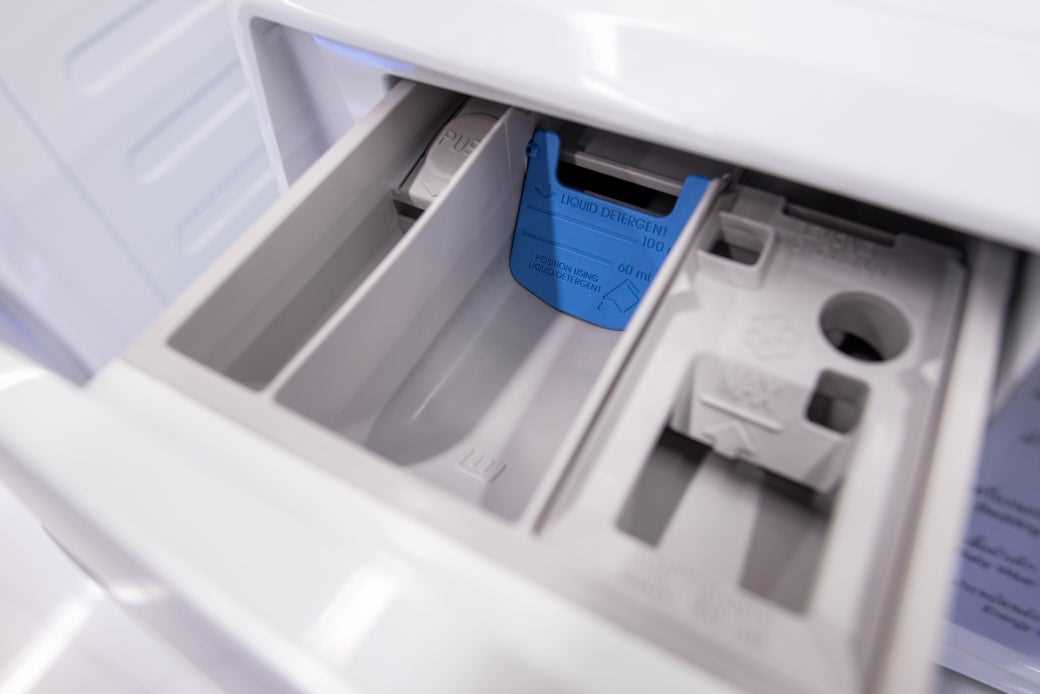
In summary, using toilet bleach in your washing machine may not be safe due to the potentially harmful chemicals and fumes produced. While it may be effective in removing stains and disinfecting your machine, it can cause damage to the machine itself and could be harmful to your health.
Based on the information provided, it is recommended to avoid using toilet bleach in your washing machine. Instead, opt for a mild detergent specifically designed for washing machines. These detergents are formulated to effectively clean your clothes and machine without causing harm.
Additionally, regular cleaning and maintenance of your washing machine can help prevent the buildup of dirt, grime, and bacteria. Follow the manufacturer’s instructions for cleaning and use recommended cleaning products, if necessary.
In case you need to disinfect your washing machine, consider using a non-toxic and environmentally friendly option such as white vinegar or baking soda, which can effectively remove odors and kill bacteria.
Ultimately, prioritizing your health and the longevity of your washing machine is important. By using appropriate detergents and cleaning agents, you can ensure that your machine remains in good working condition and that your clothes are cleaned effectively and safely.
FAQ
Is it safe to use toilet bleach in my washing machine?
No, it is not safe to use toilet bleach in your washing machine. Toilet bleach is designed specifically for use in toilets and contains chemicals that can be harmful to fabric and the appliance itself. It is best to use laundry bleach or other laundry-specific products in your washing machine.
What will happen if I use toilet bleach in my washing machine?
If you use toilet bleach in your washing machine, it can damage the fabric of your clothes and the appliance itself. The strong chemicals in toilet bleach can cause colours to fade, whites to turn yellow, and fabrics to become weakened or discoloured. It can also damage the internal components of your washing machine and affect its performance.
Can I use toilet bleach as a substitute for laundry bleach in my washing machine?
No, you should not use toilet bleach as a substitute for laundry bleach in your washing machine. Toilet bleach is not designed for use on laundry and can cause damage to fabric and the appliance. Laundry bleach is specifically formulated to be safe and effective for use in washing machines.
What are the alternatives to using toilet bleach in my washing machine?
There are several alternatives to using toilet bleach in your washing machine. You can use laundry bleach, which is specifically formulated for use on fabrics and in washing machines. Other options include oxygen bleach, which is a gentler alternative, or using natural cleaning agents such as vinegar or baking soda. These alternatives can effectively remove stains and odours from your clothes without causing damage to fabric or the appliance.
What are the dangers of using toilet bleach in my washing machine?
The dangers of using toilet bleach in your washing machine include potential damage to fabric and the appliance itself. The strong chemicals in toilet bleach can cause fabrics to become discoloured, weakened, or damaged. It can also corrode or erode the internal components of your washing machine, leading to decreased performance and potentially costly repairs. It is important to use products specifically designed for use in washing machines to ensure safety and maintain the longevity of your appliance.
Can I use toilet bleach in my washing machine?
It is not recommended to use toilet bleach in your washing machine. Toilet bleach contains strong chemicals that can damage the delicate components of your washing machine. It is better to use laundry detergent specifically designed for washing machines.
What are the risks of using toilet bleach in a washing machine?
Using toilet bleach in a washing machine can be risky. The strong chemicals in toilet bleach can damage the rubber seals and plastic parts of the machine, leading to leaks and malfunctions. It can also cause discoloration or damage to your clothes. It is best to stick to using laundry detergent specifically made for washing machines.











